口译学习心得体会PDF.pdf
口译教学名师韩刚揭秘外交部口译学习方法

⼝译教学名师韩刚揭秘外交部⼝译学习⽅法外交部⼝译员,⼀个充满神秘的职业。
每年两会记者招待会上总理引经据典,侃侃⽽谈,都能被外交部⾼翻迅速⼝译成精彩的译⽂,令⽆数⼈为之折服。
⽇前,⼝译⽹有幸独家专访了毕业于外交学院英语翻译理论与实践专业,曾以优异成绩考⼊外交部翻译室接受培训,后调任新闻司担任新闻发⾔⼈同传的著名⼝译教学名师——韩刚先⽣,请他以⾃⾝的学习和⼯作经历向⼴⼤⼝译学习者现⾝说法,并回答各位⼝译⽹⽹友提出的问题。
以下为访谈实录:韩刚⽼师接受⼝译⽹独家专访主持⼈:韩刚⽼师,您好!⾮常⾼兴您能在百忙之中接受⼝译⽹的专访并回答各位⽹友的提问。
您在翻译圈⼦⾥名⽓很⼤,曾为国际⼤型会议担任同传数百场,⼝译实战经验⾮常丰富,您能否简单介绍⼀下您是怎样⾛上⼝译这条道路的?韩刚⽼师:这个问题说来话长,不过还是长话短说。
我就读⾼中的时候⽂理科都⽐较强,理科应该更好些,英语单科相对突出。
当时我的英语⽼师为了让我留在⽂科班,在⽂理分科的时候就苦⼝婆⼼地“劝降”,最后他说:“你学⽂科会更有前途。
你看,每天新闻联播中领导⼈接待外宾时后⾯都坐着翻译,多体⾯、光荣的⼯作啊,我看你做这个⼯作很适合,相信我!”就这么简单的⼀句话,让我内⼼萌⽣了吃“翻译饭”的念头,这个念头⾃此挥之不去,⼀直⽀撑着我⾛过了这么多年。
通过⾃⼰坚持不懈的努⼒,我考取了外交学院,研究⽣专门研读翻译理论与实践,跟随恩师范守义、褚⼴友、王燕、任⼩萍等教授系统学习了有关⼝笔译的理论与技巧,后来研究⽣毕业的时候⼜有幸被外交部翻译室录取参加为期三个⽉的培训,直到后来被分到新闻司为新闻发⾔⼈专职服务。
在新闻司的⼯作可以说让我有了更⾼的使命感,对世界⼤事更加敏锐,更深知做翻译,尤其是⼝译⼯作的苦与乐,这个⼯作通俗点说,就是“痛并快乐着!”回头看看的话,⼝译就是“路漫漫其修远兮,吾将上下⽽求索”,必须做到每⽇“拳不离⼿曲不离⼝”,跟其他诸如歌唱、戏剧、舞蹈等⼯作没有区别,⼏天不练习就会⼿⽣、⼝涩、脑慢,正如“逆⽔⾏⾈,不进则退”。
口译实训的收获与体会(汇总12篇)

口译实训的收获与体会(汇总12篇)(经典版)编制人:__________________审核人:__________________审批人:__________________编制单位:__________________编制时间:____年____月____日序言下载提示:该文档是本店铺精心编制而成的,希望大家下载后,能够帮助大家解决实际问题。
文档下载后可定制修改,请根据实际需要进行调整和使用,谢谢!并且,本店铺为大家提供各种类型的经典范文,如职场文书、公文写作、党团资料、总结报告、演讲致辞、合同协议、条据书信、心得体会、教学资料、其他范文等等,想了解不同范文格式和写法,敬请关注!Download tips: This document is carefully compiled by this editor. I hope that after you download it, it can help you solve practical problems. The document can be customized and modified after downloading, please adjust and use it according to actual needs, thank you!Moreover, this store provides various types of classic sample essays for everyone, such as workplace documents, official document writing, party and youth information, summary reports, speeches, contract agreements, documentary letters, experiences, teaching materials, other sample essays, etc. If you want to learn about different sample formats and writing methods, please pay attention!口译实训的收获与体会(汇总12篇)通过总结心得体会,我们能够更好地反思自己的行为和做事方式,不断提高自己的综合素质。
浅谈口译实践心得

- 216 -校园英语 /翻译探究浅谈口译实践心得长春建筑学院/陈乃嘉【摘要】口译活动当中,口译的目的、标准和口译时遇到的问题是很多人探究的课题,究竟在不同的活动当中怎样才能更好的进行翻译活动?笔者结合自身的实践心得,试从以上三方面进行总结和归纳,以为今后的口译活动提供更好的借鉴作用。
【关键词】口译 目的 标准 问题一、前言现如今英语使用者的数量成倍增长,英语口译活动也由于我国的不断对外招商和中国市场的健康发展在不断地增多。
口译是沟通于不同民族和不同文化之间的必备桥梁,如何能够将口译流畅准确的翻译出来是很多口译工作者乃至学者孜孜不倦探寻的一个过程。
笔者试结合自己的实践心得,结合自身的翻译事例,探究口译的目的,标准和口译过程中的问题,对于口译的研究和分析做出自己的理解和分享。
二、口译实践心得笔者根据自己的实践经验,分别从口译的目的,口译的标准和口译过程当中可能遇到的问题三个方面来总结出自己的口译实践心得,在实践过程发现,遇到的问题大同小异,只要把握住目的、标准这两个方面,口译当中所能遇到的问题也就不是那么的令人紧张和尴尬。
1.口译目的。
尤金•A •奈达在他的翻译理论当中提出了关于口译的目的当中的两个标准,即最低标准和最高标准。
所谓的最低标准就是使译出语的听者对于翻译的理解能够想象得出原作者或原说话人是如何理解自己说出的话的,而所谓的最高标准是译出语的听者能够感同身受的理解并且欣赏原作者或者原说话人的心理感受。
这样的翻译活动实则便是在极大地考验着译者的水平和语言文化功底,对于笔译者而言,时间上的大量把控和语言材料的随意翻阅是相对比较容易找到信息参考点或者辅助工具的,然而对于口译者而言,想要从最低标准上升到最高标准,需要很长时间的磨练和深厚的语言功底的准备。
口译的目的看似比较简单,然而在实际的操作和实践当中并不是很容易完成。
口译活动是一个动态的活动过程,完整的、优秀的口译活动应当一方面能够完整的表述出说话人的原意,且不是生搬硬套,逐字逐句的进行翻译,另一方面,口译工作者还应当将说话人的语言风格进行很好的转达,以便令听话人得知说话人的性格和特征,方便交谈双方的友好沟通。
多模态口译教学中的口述影像

2023年11月第39卷㊀第6期外国语文(双月刊)Foreign Languages and Literature(bimonthly)Nov.,2023Vol.39㊀No.6收稿日期:2023-07-13基金项目:国家社会科学基金项目 口述影像训练对口译认知加工能力的效应研究 (20BYY031)的阶段性成果作者简介:詹成,男,中山大学外国语学院教授,博士,博士生导师,主要从事口译理论与实践研究㊂张晗,女,中山大学外国语学院博士生,主要从事口译理论与实践研究㊂引用格式:詹成,张晗.多模态口译教学中的口述影像:研究现状与前景展望[J].外国语文,2023(6):151-158.多模态口译教学中的口述影像:研究现状与前景展望詹成㊀张晗(中山大学外国语学院,广东广州㊀510275)摘㊀要:在口译教学中,教师以口译技能为主线,对口译各项子技能进行合理训练,开发并提升学生的口译能力㊂口述影像是对视觉信息的口头描述,通常被认为是视听翻译的一种类型㊂口译和口述影像均涉及多模态信息的接收㊁理解和表达,口述影像作为多模态口译教学训练的新方法,可以促进口译(子)能力的发展㊂本文采用文献法,基于口述影像与口译在多模态信息输入㊁信息加工和信息输出环节上的共性,考察多模态口译教学中的口述影像研究㊂现有研究显示,口述影像作为一种教学方法,对口译学习者的注意资源分配能力㊁信息记忆与整合能力以及目标语表达能力等具有积极效应㊂相关研究虽存在学理分析不深入㊁研究问题较笼统㊁论证方法欠丰富等问题,但口述影像在方法论上具备应用于多模态口译教学的实践意义,该领域的研究也有一定前景㊂关键词:口述影像;口译;口译教学;多模态;口译能力中图分类号:H09㊀㊀㊀文献标志码:A㊀㊀㊀文章编号:1674-6414(2023)06-0151-080㊀引言口述影像,或称 视障口述影像服务 ,是将影像信息转换成叙事言语,使视障人士能够感知比较完整的画面内容㊂口述影像涉及视觉符号和言语符号之间的转换,因而传统上被看作是视听翻译的一种形式,纳入翻译研究领域㊂萨宾㊃布劳恩(Sabine Braun)认为现场开展的口述影像是一种区别于视听翻译的 视听口译 (Braun,2008:14-30)㊂露易丝㊃弗赖尔(Louise Fryer)也指出,现场口述影像活动和口译由一套共同的交际要素制约(Fryer,2016)㊂现场口述影像活动更接近于口译,涉及的不是两种不同语言,而是以视觉符号为 源语 ,译入视障人士所使用的 目标语 ㊂口述影像的源语为多模态立体语篇,其意义由发言人的语言信息和非语言信息复合而成(蒋莉华等,2020);而口译活动中言语㊁副言语和体态语被视为功能上相互关联的结构整体,三者在不同的交际场合中或同时发生,或轮流运作,或相互替代,共同产生和传递意义(Poyatos,1987:240-242)㊂弗朗兹㊃波契哈克(Franz Pöchhacker)指出,模态构成了口译研究的新一轮转向(Pö吸气,2022)㊂在口译教学中,模态一词被用于描述不同形式的符号资源,如书面文本㊁语言文本㊁图像㊁声音等来建构意义和表征意义的过程(康志峰等,2023)㊂现有研究多考察如何使用多模态学习资源㊃151㊃㊀外国语文2023年第6期㊀和学习环境等丰富口译课堂活动和学生自主练习(陈卫红,2014;刘剑,2017;黄立鹤等,2021),而针对多模态口译技能训练的探讨尚不多见㊂以技能为主线的口译训练应是口译教学把握的重点(詹成,2022a),因此需充分开发和利用口译训练维度的多模态资源,使其与口译能力培养形成有机结合㊂由于口述影像对多模态信息的辨别㊁理解㊁加工㊁输出等能力均有一定要求,已经在外语教学和翻译训练中得到应用,成为一种技能强化的多模态训练手段㊂本文基于对口述影像与口译多模态信息处理机制的探讨,考察评述对口述影像训练用于口译教学的相关研究,并在分析研究现状的基础上,对口述影像在多模态口译教学中的研究前景提出展望㊂1㊀多模态口译教学中的口述影像方法理据口译实践的核心在于调动双语认知处理㊁信息加工和人际协调,这种行为需发挥译员的专业技能㊂在‘中国翻译能力等级测评标准“(2022:3)中,口译能力被界定为 语言学习者和实践者以口语或手语形式,运用掌握的语言能力和翻译技巧,准确传达源语言中以文本㊁口语㊁中国手语表达的内容所包含的信息的能力 ㊂多模态口译教学的重点在于技能训练㊂口述影像涉及不同模态之间的信息加工与转换㊂口译能力与口述影像能力相关联,形成了口述影像应用于多模态口译教学活动的方法理据㊂在语言习得维度上,口述员需熟练掌握母语,灵活地遣词造句,精练表达,以及对语域和风格等做出正确决策,这些都与口译员需具备的语言能力高度相似(Fryer,2019:155-178),因此有研究探讨了口述影像训练对口译子能力如口语水平(Moreno et al.,2015)㊁词汇准确度和句法应用能力(Calduch et al.,2017)及语法能力(Schaeffer-Lacroix,2020)等的积极效应,主要关注口译中的语言(外语)能力㊂值得一提的是,已有研究论证,经过外语口述影像的训练,学生的翻译能力得到显著提升(Talaván et al.,2022)㊂除语言技能和翻译能力外,对于口译更为关键的认知能力方面,口述影像与口译亦有共通之处㊂在信息处理维度上,口述影像的多模态源文本主要包含视觉和听觉信息,听觉信息多呈显性,视觉信息则多呈隐性㊂对多模态源语的理解要整体考虑所有模态传递的信息,确定隐性视觉信息在视听文本整体意义中的作用,并挑选出需要描述的视觉内容进行传达(蒋莉华等,2020)㊂口译是多模态互动的意义生成过程,译员亦需理解整合各种模态的信息㊂如在交替传译中,译员对非语言信息的捕捉对于意义传递具有积极作用,尤其是在信息输入阶段,若与讲者有频繁的眼神交流,其译语的准确性与一致性更高(Ouyang et al.,2020);而在同声传译中,译员可见讲者姿势,会增强译员在场感与信息明确性,对同声传译质量产生积极效应(詹成等,2021)㊂可见,多模态信息是口译与口述影像意义传达不可或缺的资源,并动态存在于各个认知环节,如表1所示㊂表1㊀口述影像与口译的多模态认知过程口述影像口译信息输入源语视听㊁信源解码源语听辨㊁信源解码信息加工理解加工㊁模态转换理解加工㊁语言转换信息输出信息重组㊁言语表达信息重组㊁目标语表达㊀㊀首先,在信息输入环节,口述员选择㊁提取视觉㊁言语和声音信息,通过已备知识和语境做出判㊃251㊃㊀詹成㊀张晗㊀多模态口译教学中的口述影像:研究现状与前景展望㊀断,并且随着新信息输入不断转码㊂对于口译员来说,源语信息同样以多信道形式进入译员的心理加工系统㊂译员通过语音知觉㊁视觉识别等认知过程,将外部输入的信息与大脑中的已备知识存储接通,进行联系㊁比照㊁分析等操作,对这些输入的符号资源进行递增解码㊂其次,在信息加工环节,口述影像涉及的视觉信息处理是评估㊁选择和决策的过程㊂口述员需区分如声音㊁音乐和对话等可通过听觉传递的信息,以及无法被视障人士所感知㊁只能通过视觉表达的信息,衡量多模态信息的搭配,即描述什么㊁何时描述以及如何描述,结合既有知识㊁专业㊁经验做出选择,激活心理表征;口译认知加工过程中,工作记忆与长时记忆相互作用,存储㊁提取应用信息,并在两种语言的竞争中维持语码转换,建构命题意义㊂最后,信息输出时,口述员通常以与视听文本言语模态相同的语言符号编码,并在合适的声音间隙进行表述,保障视障听众模态信息接受与理解的连贯性(Holsanova, 2022:59-61);而在口译产出过程中,译员须在有限的时间内以目标语语言表达形式外化的语音信号为主,同时结合发言人传递的副语言信息(如语速㊁音量㊁重音㊁语调)和非语言信息(如面部表情㊁手势㊁幻灯片),为受众构建完整的信息来源㊂多模态信源的认知加工直接影响口述影像与口译交际的质量㊂口述员与口译员作为多模态信息的接受者和发送者,须时刻考量多模态信息交互的作用,具备理解㊁分析不同模态及其意义生成的多维识读能力㊂2㊀多模态口译教学中的口述影像研究现状有少数研究者关注到口述影像与口译在多模态认知处理方面的共性,围绕口译能力的不同维度,开展了一定的理论探讨与实证研究,总结出口述影像作为多模态口译教学新方法的积极成效㊂研究者均认为,在口译教学中运用口述影像训练,能够对学生的注意力分配㊁信息记忆与整合㊁目标语表达等方面的能力产生作用㊂2.1注意力分配能力口译活动,尤其是带稿同传,以及随着数字技术发展兴起的新型口译形式 交同传(consec-simul) (Orlando,2014),由于多感官输入和视觉干扰,对认知处理有更高的要求㊂译员需注意听觉频道的讲者源语和视觉频道的源语文本信息,促发认知资源的协调和分配㊂当视听信息不一致时,译员要付出更大的认知努力;信息一致时,能灵活识别有助于听觉加工的视觉信息(苏雯超等, 2021)㊂观察能力是口述影像员必备的能力之一(Snyder,2005),口述影像的认知加工过程涉及因源语篇接收所触发的视觉信息抓取行为㊂通过训练对视觉信息的观察与分析,并与听觉信息相互配合,可帮助译员适应多渠道信源的注意力分配㊂香港城市大学的鄢秀(Jackie Xiu Yan)和罗康特(Kangte Luo)尝试将口述影像训练植入口译专业研究生课程中,开展了系列研究(Yan et al.,2022)㊂在为期两周的母语口述影像训练中,设计课堂活动,有意识地凸显视觉信息的丰富性和重要性,引导学生抓取和分析多模态语篇中的视觉资源㊂课后调查显示口述影像训练对于学生的口译能力有积极效应,学生高度认可㊂口述影像训练显著地提高了学生的观察能力,使他们更加注意讲者的情感和语气,对于情境中的元素更为敏感(Yan et al.,2022:431)㊂另一研究发现了学生在接受口述影像训练后,在视觉与听觉信息并行的情况下,能够更好地平衡不同模态之间的注意力分配,在有限认知资源的竞争中保持对于其他模态信息的敏感度㊂因此,口述影像训练可强化口译学习者多任务的注意资源分配能力㊂㊃351㊃㊀外国语文2023年第6期㊀2.2信息记忆与整合能力口译任务所需的源语语言信息和其他感知信息汇聚在工作记忆系统中,在中央执行系统的协调控制下,主要由工作记忆系统的语音回路负责集中处理,随后进入语言转换系统(张威,2012)㊂在口译训练中,当讲者的语言信息形成图像,注意力便从具体的语言符号转到讲话人的 意义 上来,协调视觉空间模板和语音回路的配合,持续的视觉化训练可提升译入语信息产出的质量(詹成等,2014)㊂口述影像的认知加工过程必然涉及视觉信息存储㊁阐释与重新概念化的视觉化加工过程㊂因此,可利用口述影像视觉化信息处理机制提升口译工作记忆效率和整合信息的水平㊂丁欣如(2022)以行动研究法为主,准实验研究法为辅,探讨了外语口述影像练习在本科口译教育中的作用㊂在为期一学期的实验中,针对本科翻译专业三年级的‘交替传译“课程开展三轮行动㊂通过各轮结束时的问卷与学习者反思日志㊁访谈㊁汉英交替传译前后测试成绩等数据分析,发现口述影像训练对于口译学习者的信息处理能力,尤其是提取㊁筛选和归纳重要信息方面有显著作用㊂首先,口述影像练习的多模态输入,有助于学习者改善思维方式,使其 信息记忆开始视觉化 ㊂学生在记忆信息的过程中,脑海里有意识地生成了相应画面,这对口译记忆起到了辅助作用(丁欣如, 2022:73)㊂其次,口述影像的练习提升了学生的信息辨析整合能力,交替传译时提取关键信息的能力(同上:72),从而提高了信息的储存和转化效率㊂同样,在鄢秀和罗康特的研究中,受试学生的总结能力得到了提升(Yan et al.,2022)㊂因此,图像和语言信息㊁视觉和听觉信息的 视觉化 加工使口述影像训练在培养口译学生的信息存储与加工效率方面具有较大潜力㊂2.3目标语表达能力多模态媒介在提高译员概念认知准确性和概念关系认知全面性方面具有优势㊂口译过程可视为一个译员在 思维世界㊁现实世界和符号世界之间进行循环复试认知处理的过程 (宁海霖, 2021)㊂口述影像中的图像可集中凸显概念的多维度特质,也可以显示专业领域中概念间的各种关系㊂相比通过语言文字进行知识内化,以多模态资源为媒介的认知过程中,译员能够直接接触承载语义的客体,摆脱他者认知滤镜与语言滤镜,减少认知的干扰和损耗,提高语言习得的准确性和全面性㊂弗赖尔(Fryer,2019)认为,在目标语表达环节,口述影像和口译由一套共同的交际要素制约,两者在可理解性㊁表达㊁语言㊁语法㊁忠实度㊁连贯度及可信度㊁同步性等方面,有诸多共同点㊂香港浸会大学的杨慧仪(Jessica Yeung)为口译专业的学生设计了30小时的口述影像教学课程(Yeung, 2007:234-235)㊂在熟悉口述影像的基本知识后,学生为不同的艺术形式做口述影像的练习,内容包括戏曲㊁舞蹈㊁电影㊁绘画㊁博物馆游览,以及公共事件等真实的多模态情境㊂考虑到香港地区的双语特点和口译专业的双语训练性质,每种艺术形式的口述训练均以粤语和英语进行㊂在课程结束后的焦点小组讨论中,学生普遍反馈良好,享受训练过程,表示在口述影像学习中提升了口译技能,特别是语言应用能力,包括对概念的准确认知与词汇的准确应用㊂现有研究的结论较为一致,均显示口述影像训练有益于口译学生的目标语习得和应用,促进了语义和概念的内化㊂在外语口述影像训练后,有学生认为个人 最大的提升在于词汇的积累 ,或 会用更地道的语言来表达 , 对于一些动作和情景的表达,用词更加灵活 , 会主动使用口述影像中的词汇 等(丁欣如,2022:76),提升了B语言的使用意识和能力;母语口述影像训练同样提升了语言技巧和交际能力,包括词汇知识㊁描述技能等(Yan et al.,2022)㊂㊃451㊃㊀詹成㊀张晗㊀多模态口译教学中的口述影像:研究现状与前景展望㊀3㊀多模态口译教学中的口述影像研究不足将口述影像作为口译训练手段应用于多模态口译教学的相关实践尚处于起步阶段,无论是在促进以语言技能为主的口译子能力方面,还是在提升更为核心的认知加工能力方面,现有研究均显示出口述影像训练对多模态口译训练具备一定的应用价值㊂但相关研究从数量上看仍不具规模,在研究的深度上也存在以下不足㊂(1)相关理据有待厘清㊂口述影像与口译能力的重合仅仅是可开展相关研究的初步依据㊂口译研究蓬勃发展的几十年里,有大量实证研究探讨提升口译能力的有效途径,如工作记忆训练(刘玉花等,2021)㊁干扰抑制训练(Dong et al.,2020)等㊂相比之下,若仅凭口述影像与口译二者在语法规范㊁语义连贯㊁表达流畅㊁符际转换等方面的相似要求作为依据,虽得出积极结论,其说服力易遭到质疑㊂对于口译这样一项复杂的技能组合而言,欲阐明双语转换与模态转换的可比性和内在关系㊁多模态资源减少认知负荷或加工时延的原理等问题,需依靠更为深入㊁细致乃至跨学科的分析㊂要体现口述影像作为训练手段的科学性㊁适切性和独特性,需建构更为严谨的理论基础㊂(2)研究问题不够细化㊂现有研究将口述影像作为一种训练方法作用于口译教学,尽管得出积极结论,仍更多地停留在其可接受性和应用潜力上,并未深入地针对某一项口译能力进行聚焦式探讨,或重点利用其语料和信息处理的多模态特性,研究口述影像起效的具体机制㊂口译教学的内容涉及理解语言与信息㊁记忆语言与信息㊁多任务协调与处理㊁口译笔记与解读㊁口译知识与技巧㊁肢体表现与技能㊁语言与信息表达(仲伟合等,2012:169),上述方面均可成为口述影像发挥训练效用的研究主题㊂仅将口述影像整体作为一个新型课堂活动,运用在口译教学中,在缺乏明确研究问题的情况下,欲达到最大程度的等效,或导致口述影像能力移植到口译能力的操作距离过远,影响了研究结果的精确性,且难以获得新的发现㊂(3)论证方法比较薄弱㊂多模态翻译教学研究多停留在讨论活动本身的多模态特征及开展多模态教学的意义与方法,相关实证研究㊁对比研究较少,也鲜有从学习者群体了解多模态翻译与教学的接受情况(李小华等,2021)㊂多模态口译教学中的口述影像研究结论多依赖受试反馈,部分研究采用访谈㊁焦点小组㊁调查问卷等研究工具,仅有个别研究设置了实验组和对照组,通过前后测收集量化数据(丁欣如,2022)㊂对于口述影像起效机制的描述和成因分析亦以主观解释和经验判断为主㊂因此,现有的外部数据难以科学地说明口述影像作为多模态跨符际翻译行为如何影响甚至改变受训者信息接收㊁分解㊁存储㊁加工㊁输出的过程,对于口述影像训练在口译能力提升中的效应解释力显然比较薄弱,且出现了一定程度的重复性㊂4㊀多模态口译教学中的口述影像研究前景通过对相关文献的梳理分析,可见口述影像应用于多模态口译教学,对于提升学生口译能力,丰富口译训练手段具有积极效应㊂未来口译教学将可能更多地转向多模态手段,应充分研究口述影像在口译训练方面的价值㊂针对相关研究的现状及不足,建议未来可从如下方面推进: (1)拓展研究维度,深化机制探索㊂口述影像与口译是口述员/译员在社会情境中的多模态亲历过程,对包含语言㊁副语言及非言语行为等在内的各种符号资源进行整体性分析才能对多模态翻译行为进行完整的㊁动态的解读㊂口译作为综合性极强的复杂技能,涉及信息理解 记忆 转换㊃551㊃㊀外国语文2023年第6期㊀表达 互动的阶段(吴文梅,2023),因此二者的融合性研究可在更多环节和层面上开展㊂口述影像活动涉及知识内容的理解㊁加工㊁迁移和接受,以及信息解读和重构过程中的制约与调控动能(詹成,2022b),如何描述和解释这种制控能力对于口译能力的提升机制是研究需解决的核心问题㊂(2)创新研究方法,借鉴已有范式㊂口译研究与口述影像研究在认知加工方面均有较成熟的范式㊂目前口译的认知路径研究参照了认知语言学㊁认知心理学㊁心理语言学和神经语言学等学科的范式,使用如多模态语料库㊁心理计量㊁眼动㊁脑电波㊁神经成像等先进的研究工具㊂现有口述影像研究也利用了上述工具探索视障人士的感官接受和记忆机制,但较少提及口述员作为信息接受和发送者的多模态认知过程㊂在多模态教学领域也有待探索将心理实验法㊁脑神经实验法等量化分析方法应用于多模态教学实验(刘玉梅等,2021)㊂注重描写工具的科学性,可更加精确地测量多信道符号从接收到产出的过程,加深对于多模态信息认知处理的理解,为口述影像训练提升口译能力的原理提供坚实依据㊂(3)丰富研究设计,提高交互质量㊂未来研究可涉猎更多的解释变量,探讨如口述语言㊁文本类型㊁口译方向㊁口译模式等更多影响因素的相关性,使研究结果更具可信度㊂口译能力的具体习得过程和能力发展曲线尚待探索(李希希,2021),发掘口述影像作用于不同口译能力和不同能力发展阶段中的机制可更充分地释放其作为多模态口译教学手段的潜力㊂同时,在训练内容设计方面也应向口译实践倾斜㊂现有研究口述影像练习的选材多为电影片段,与口译场景的主题与情境知识存在一定差距㊂可优先选择与口译实践的主题知识和情境图示相近的多模态语篇,如外交㊁法律㊁医疗等场景的影像,加速多模态知识的理解与迁移,提升情境口译水平㊂此外,还可与社会层面的口述影像实践进行联动,优化学习过程,提升研究效果㊂5㊀结语口述影像作为多模态意义建构的复杂翻译过程,在信息输入㊁信息加工和信息输出环节与口译有相似之处㊂针对在多模态口译教学中的口述影像应用的研究表明,口述影像训练可提高如注意资源分配能力㊁信息记忆与整合能力㊁目标语表达能力在内的口译能力㊂当下,新技术推动着口译职业化飞速发展,远程口译㊁人工智能㊁语音识别等新技术深刻影响着口译实践,多模态信息的在场与缺失增加了交际行为的复杂性和风险,对译员的认知资源整合和调控能力提出了更高的要求㊂口述影像既是认知操作和话语产出过程,又是跨文化交际协调行为,更是一种社会文化活动,作为一种多模态翻译实践嵌入口译训练,在应用维度和研究价值上前景广阔,能够拓展和丰富口译研究的领域㊂同时,由于我国的口述影像研究整体上仍处于起步阶段,充分发挥其与口译融合的可能性和有效性,并对其进行科学的研究和验证,也能更好地指导我国口述影像活动发展,提升口述影像的社会意义㊂参考文献:Braun,S.2008.Audiodescription Research:State of the Art and Beyond[J].Translation Studies in the New Millennium(6): 14-30.Calduch,C.&N.Talaván.2017.Traducción Audiovisual y Aprendizaje del Español Como L2:El Uso de la Audiodescripción [J].Journal of Spanish Language Teaching(2):168-180.Dong,Y.P.&P.Li.2020.Attentional Control in Interpreting:A Model of Language Control and Processing Control[J].㊃651㊃㊀詹成㊀张晗㊀多模态口译教学中的口述影像:研究现状与前景展望㊀Bilingualism:Language and Cognition(4):716-728.Fryer,L.2016.An Introduction to Audio Description:A Practical Guide[M].Abingdon:Routledge.Fryer,L.2019.Quality Assessment in Audio Description:Lessons Learned from Interpreting[G]ʊE.Huertas-Barros,S. Vandepitte&E.Iglesias-Fernández.Quality Assurance and Assessment Practices in Translation and Interpreting.New York:RoutledgeHolsanova,J.2022.A Cognitive Approach to Audio Description:Production and Reception Processes[G]ʊC.Taylor&E. Perego.The Routledge Handbook of Audio Description.New York:Routledge.Moreno,A.I.&ing VISP(Videos For Speaking),A Mobile App Based On Audio Description,to Promote English Language Learning Among Spanish Students:A Case Study[J].Procedia-Social and Behavioral Sciences (3):132-8.Orlando,M.2014.A Study on the Amenability of Digital Pen Technology in a Hybrid Mode of Interpreting:Consec-Simul with Notes[J].Translation and Interpreting(2):39-54.Ouyang,Q.H.&A.Fu.2020.Effects of Non-Verbal Paralanguage Capturing on Meaning Transfer in Consecutive Interpreting [G]ʊM.F.Zhang&D.Z.Feng.Multimodal Approaches to Chinese-English Translation and Interpreting.London&New York:Routledge.Pöchhacker,F.2022.Interpreters and Interpreting:Shifting the Balance[J].The Translator(28):148-161. Poyatos,F.1987.Nonverbal Communication in Simultaneous and Consecutive Interpretation:A Theoretical Model and New Perspectives[G]ʊF.Pochhacker and M.Shlesigner.The Interpreting Studies Reader.London:Routledge. Schaeffer-Lacroix,E.2020.Integrating Corpus-Based Audio Description Tasks into an Intermediate-Level German Course[J]. International Journal of Applied Linguistics(2):1-20.Snyder,J.2005.Audio Description.The Visual Made Verbal Across Arts Disciplines Across the Globe[J].Translating Today (4):15-17.Talaván,N.,J.Lertola&A.I.Moreno.2022.Audio Description and Subtitling for the Deaf and Hard of Hearing[J]. Translation and Translanguaging in Multilingual Contexts(1):1-29.Yan,X.&K.T.Luo.2022.Introducing Audio Describer Training in University Interpreting Classes[J].Journal of Visual Impairment&Blindness(3):425-432.Yeung,J.2007.Audio Description in the Chinese World[G]ʊJ.Diaz-Cintas,P.Orero&A.Remael.Media for All: Subtitling for the Deaf,Audio Description and Sign Language.Amsterdam/New York:Rodopi.陈卫红.2014.网络环境下口译课多模态教学模式的构建[J].上海翻译(3):51-54.丁欣如.2022.外语口述影像练习对翻译专业本科生口译能力的影响[D].上海:上海外国语大学.黄立鹤,吴赟.2021.基于贴真体验与建模的多模态口译教学语料库构建及应用[J].外语教学理论与实践(4):127-136.蒋莉华,李颖.2020.翻译研究新动向:口述影像的多模态分析[J].外语教学(5):99-103.康志峰,肖婷,李夏青.2023.转型期多模态口译课程思政探赜[J].上海翻译(1):60-65+96.李希希.2021.国内外口译能力研究(1931 2019):回顾与反思[J].外国语文(1):113-121.李小华,唐青叶.2021.国内多模态翻译研究的可视化分析:现状㊁问题及建议[J].北京科技大学学报(社会科学版)(5): 534-542.刘剑.2017.基于多模态语料库的口译教学模式研究[J].外语电化教学(2):9-14+21.刘玉花,陈小聪,董燕萍.2021.口译与工作记忆的双向促进关系及其发展变化[J].中国外语(5):55-63.刘玉梅,王晓峰.2021.国内多模态研究热点与趋势(2010 2020) 基于CiteSpace的可视化分析[J].外国语文(6): 66-74.宁海霖.2021.译者专业领域知识的多模态习得研究[J].中国科技术语(3):42-48.㊃751㊃。
英语翻译实训心得体会范文五篇
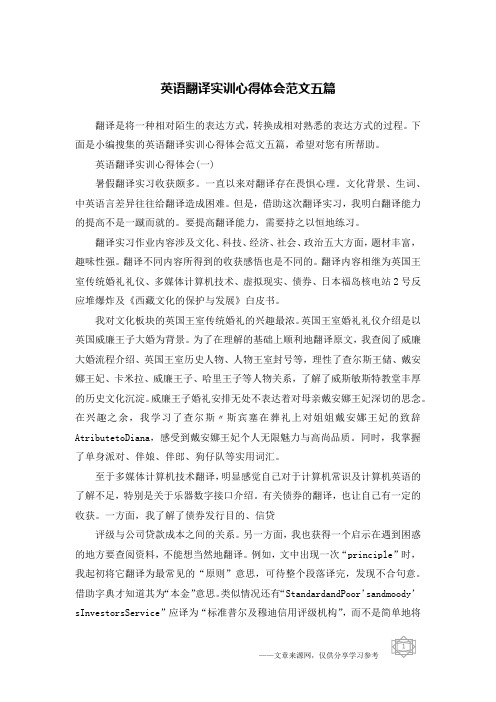
英语翻译实训心得体会范文五篇翻译是将一种相对陌生的表达方式,转换成相对熟悉的表达方式的过程。
下面是小编搜集的英语翻译实训心得体会范文五篇,希望对您有所帮助。
英语翻译实训心得体会(一)暑假翻译实习收获颇多。
一直以来对翻译存在畏惧心理。
文化背景、生词、中英语言差异往往给翻译造成困难。
但是,借助这次翻译实习,我明白翻译能力的提高不是一蹴而就的。
要提高翻译能力,需要持之以恒地练习。
翻译实习作业内容涉及文化、科技、经济、社会、政治五大方面,题材丰富,趣味性强。
翻译不同内容所得到的收获感悟也是不同的。
翻译内容相继为英国王室传统婚礼礼仪、多媒体计算机技术、虚拟现实、债券、日本福岛核电站2号反应堆爆炸及《西藏文化的保护与发展》白皮书。
我对文化板块的英国王室传统婚礼的兴趣最浓。
英国王室婚礼礼仪介绍是以英国威廉王子大婚为背景。
为了在理解的基础上顺利地翻译原文,我查阅了威廉大婚流程介绍、英国王室历史人物、人物王室封号等,理性了查尔斯王储、戴安娜王妃、卡米拉、威廉王子、哈里王子等人物关系,了解了威斯敏斯特教堂丰厚的历史文化沉淀。
威廉王子婚礼安排无处不表达着对母亲戴安娜王妃深切的思念。
在兴趣之余,我学习了查尔斯〃斯宾塞在葬礼上对姐姐戴安娜王妃的致辞AtributetoDiana,感受到戴安娜王妃个人无限魅力与高尚品质。
同时,我掌握了单身派对、伴娘、伴郎、狗仔队等实用词汇。
至于多媒体计算机技术翻译,明显感觉自己对于计算机常识及计算机英语的了解不足,特别是关于乐器数字接口介绍。
有关债券的翻译,也让自己有一定的收获。
一方面,我了解了债券发行目的、信贷评级与公司贷款成本之间的关系。
另一方面,我也获得一个启示在遇到困惑的地方要查阅资料,不能想当然地翻译。
例如,文中出现一次“principle”时,我起初将它翻译为最常见的“原则”意思,可待整个段落译完,发现不合句意。
借助字典才知道其为“本金”意思。
类似情况还有“StandardandPoor’sandmoody’sInvestorsService”应译为“标准普尔及穆迪信用评级机构”,而不是简单地将“poor”、“moody”形容词的词义译出。
口译实习报告

口译实习报告
我于2021年暑假在一家翻译公司进行了口译实习。
在实习期间,我有幸参与了多场会议和活动的口译工作,积累了丰富的实践经验。
在实习的第一天,我接受了公司的培训,学习了口译的基本技
巧和规范。
我了解到口译不仅要求译员具备扎实的语言功底,还需
要具备良好的应变能力和沟通技巧。
在接下来的实习中,我不断地
提高自己的口译水平,努力做到准确、流畅地传达讲话者的意思。
在实习期间,我参与了多场会议和活动的口译工作,涉及领域
广泛,包括商务、医疗、教育等。
我通过实际工作,提高了自己的
口译能力,同时也学到了很多专业知识。
在口译过程中,我遇到了
各种各样的挑战,但通过不断地练习和积累经验,我逐渐掌握了应
对各种情况的技巧,并取得了不错的成绩。
通过这次口译实习,我不仅学到了专业知识和技能,还提高了
自己的综合素质。
我深刻体会到口译工作的重要性和复杂性,也更
加坚定了自己从事口译工作的决心。
我相信,在未来的工作中,我
会不断努力,提升自己的口译水平,为跨文化交流做出更大的贡献。
感谢公司给我这次宝贵的实习机会,让我收获了很多。
英语口译过程中影响听辨的因素和应对策略

英语口译过程中影响听辨的因素和应对策略刘洋张坤琦口译活动是通过一种口头的形式将源语进行加工传输到接受者,而进行传到信息的第一步就是对于源语信息的听取,即听力。
本文针对英语口译过程中影响英语听辨的因素进行探讨,包括背景知识和词汇量、心理素质和原语发布者的语音、语调及语速;根据相应因素提出解决策略,包括培养学生跨文化意识、扩充词汇量,树立学生自信心、加强口译锻炼和加强影子跟读训练,借助认知语境。
1 引言随着国际交流合作的进程加快,口译作为翻译一种特殊形式,在国际交流合作中扮演的重要作用也日益凸显。
口译的过程相对复杂,包含了译员对于源语的信息听取、信息辨别、加工和输出,因而在整个过程中,“听”成为了最基础同时也是最为首要的一步。
一位优秀的口译人员,尤其是专业口译人员,更应具有良好的听力能力。
口译过程中,口译人员不能只是笼统的将源语信息进行概括,而是需将每一个词、每一句话和每一个段落、段落与段落之间的衔接关系都要听清理清,任何地方的误译、漏译都将使接受者不知所以然。
在我国现在的大部分高校中都开设有英语口译相关课程,所开课程的年级也都是在大三、大四,老师培养的目标大部分是基于学生的听力水准已经达到能够进行基本的双语转换上,因而使得大部分教师在教授中着重强调记忆训练、语言输出能力、速记技巧等,忽略了对于学生听力能力的考虑。
本文将针对英语口译过程中影响听力的因素进行探讨,进而提出相应的解决策略。
2 影响英语口译听辨的因素“听”作为英语口译活动中的第一步,对口译的质量起着至关重要的作用。
但大部分学生的听力都或多或少存在不同程度的问题,导致口译第二步难以实施,本文就以下几个方面来探讨英语口译教学中影响学生听力的因素。
2.1 背景知识和词汇量的欠缺对于大部分的学生来说,单个单词能够听懂,但是连成一句话或是一个段落,学生就不能很好地掌握整体意思。
同时,与中国的典故、成语等相类似,英语某些意思的表达也有其特有的词汇,例如:rat race,在翻译时并不能按照单词本身意思翻译为老鼠竞赛,它代表的是fierce competition,e.g: She wanted to go out of the rat race. 译员在翻译的时候不能直译成“她想要走出老鼠竞赛”,而是“她想要远离你争我夺的生活”。
口译实习报告

口译实习报告
我在过去的几个月里,有幸参与了一家知名翻译公司的口译实
习工作。
在这段时间里,我有机会与一些资深的口译专家一起工作,学习了很多宝贵的经验和技巧。
在实习期间,我参与了多场会议和活动的口译工作,涉及的领
域包括商务、法律、医学和文化交流等。
通过这些实践,我不仅提
高了口译的技能,还学会了如何在不同场合下应对各种挑战和压力。
我还学会了如何在短时间内准确地理解和表达不同领域的专业术语,以及如何与客户和听众建立良好的沟通和合作关系。
在实习过程中,我也意识到口译工作需要不断的学习和提升。
我会继续努力,不断积累口译经验,提高自己的专业水平。
同时,
我也会加强对不同领域知识的学习,以便更好地胜任口译工作。
通过这次实习,我不仅获得了宝贵的实践经验,还结识了许多
优秀的口译专家,他们的经验和教诲将对我的职业发展产生深远的
影响。
我相信,这段宝贵的实习经历将成为我未来职业道路上的重
要财富。
感谢公司给予我这次难得的实习机会,我将倍加珍惜并努
力学习,为公司的口译工作贡献自己的力量。
仲伟合《英语口译教程(下)》学习辅导书(同声传译的应对策略)【圣才出品】
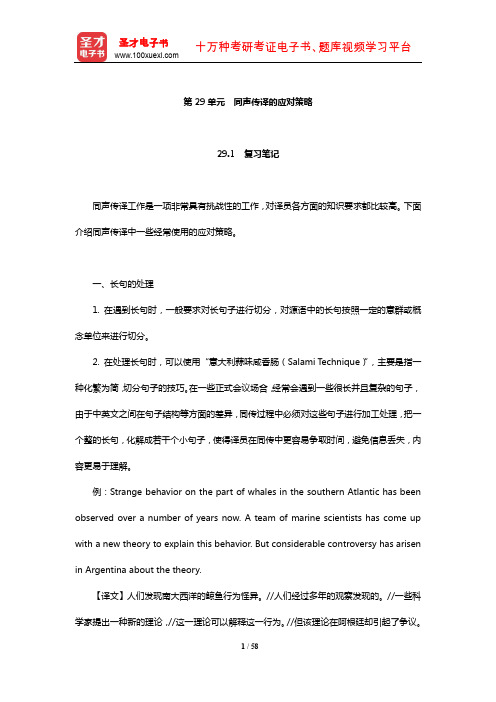
第29单元同声传译的应对策略29.1 复习笔记同声传译工作是一项非常具有挑战性的工作,对译员各方面的知识要求都比较高。
下面介绍同声传译中一些经常使用的应对策略。
一、长句的处理1. 在遇到长句时,一般要求对长句子进行切分,对源语中的长句按照一定的意群或概念单位来进行切分。
2. 在处理长句时,可以使用“意大利蒜味咸香肠(Salami Technique)”,主要是指一种化繁为简,切分句子的技巧。
在一些正式会议场合,经常会遇到一些很长并且复杂的句子,由于中英文之间在句子结构等方面的差异,同传过程中必须对这些句子进行加工处理,把一个整的长句,化解成若干个小句子,使得译员在同传中更容易争取时间,避免信息丢失,内容更易于理解。
例:Strange behavior on the part of whales in the southern Atlantic has been observed over a number of years now. A team of marine scientists has come up with a new theory to explain this behavior. But considerable controversy has arisen in Argentina about the theory.【译文】人们发现南大西洋的鲸鱼行为怪异。
//人们经过多年的观察发现的。
//一些科学家提出一种新的理论,//这一理论可以解释这一行为。
//但该理论在阿根廷却引起了争议。
3. 处理长句还要学会使用“润滑剂”。
由于在同声传译时,为了赶时间,译员往往尽可能依照原文的句法结构,即前面介绍的“顺句驱动”方法,避免做大的改动。
当把长句切为短句时,难免会造成一种断断续续、互不关联的感觉。
因此,在短句之间,要灵活地添加一些虚词。
这些词本身不具有任何意义,但却能使译出的句子听起来不那么艰涩、生硬。
仲伟合《英语口译教程(下)》学习辅导书(口译应对策略(Ⅰ))【圣才出品】
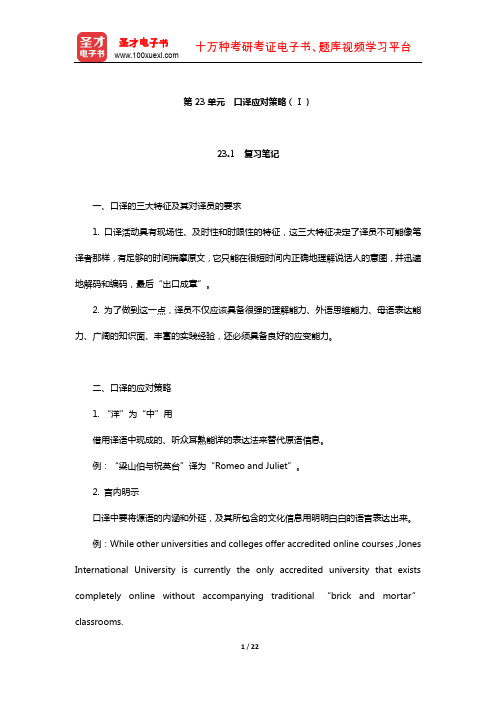
第23单元口译应对策略(Ⅰ)23.1 复习笔记一、口译的三大特征及其对译员的要求1. 口译活动具有现场性、及时性和时限性的特征,这三大特征决定了译员不可能像笔译者那样,有足够的时间揣摩原文,它只能在很短时间内正确地理解说话人的意图,并迅速地解码和编码,最后“出口成章”。
2. 为了做到这一点,译员不仅应该具备很强的理解能力、外语思维能力、母语表达能力、广阔的知识面、丰富的实践经验,还必须具备良好的应变能力。
二、口译的应对策略1. “洋”为“中”用借用译语中现成的、听众耳熟能详的表达法来替代原语信息。
例:“梁山伯与祝英台”译为“Romeo and Juliet”。
2. 言内明示口译中要将源语的内涵和外延,及其所包含的文化信息用明明白白的语言表达出来。
例:While other universities and colleges offer accredited online courses ,Jones International University is currently the only accredited university that exists completely online without accompanying traditional “brick and mortar”classrooms.【译文】虽然其它大学也提供经认证的在线课程,但是Jones国际大学则是目前完全存在于网上、完全没有传统(“砖瓦型”)教室的唯一一所获得认证的大学。
【分析】从上下文语境中,我们不难发现,其实所谓的“‘brick and mortar’classrooms”(“砖瓦水泥型”教室)指的是具有物理形态的传统教室,因为它不同于网络学校所开设的“虚拟教室”(virtual classrooms)。
有了这一层理解后,整句话就不难理解了。
3. 以“图”代“言”这一应变策略尤其适用于科技或商务类口译,这类口译本身的难度并不大,难点在于概念的解释和专业术语的运用。
口译理论——精选推荐
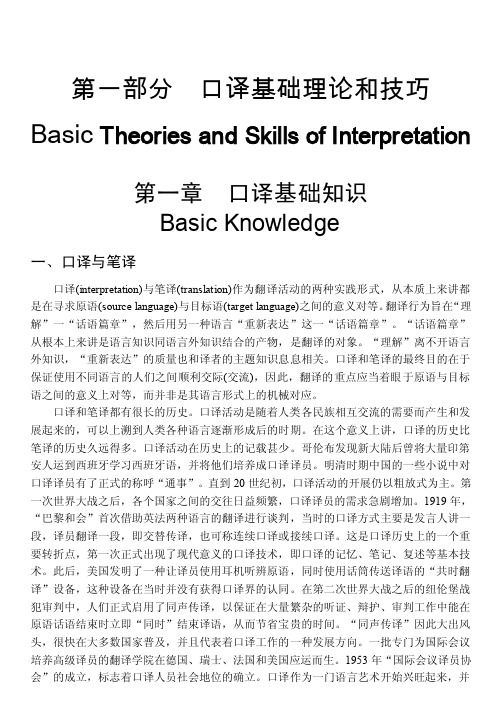
第一部分口译基础理论和技巧Basic Theories and Skills of Interpretation第一章口译基础知识Basic Knowledge一、口译与笔译口译(interpretation)与笔译(translation)作为翻译活动的两种实践形式,从本质上来讲都是在寻求原语(source language)与目标语(target language)之间的意义对等。
翻译行为旨在“理解”一“话语篇章”,然后用另一种语言“重新表达”这一“话语篇章”。
“话语篇章”从根本上来讲是语言知识同语言外知识结合的产物,是翻译的对象。
“理解”离不开语言外知识,“重新表达”的质量也和译者的主题知识息息相关。
口译和笔译的最终目的在于保证使用不同语言的人们之间顺利交际(交流),因此,翻译的重点应当着眼于原语与目标语之间的意义上对等,而并非是其语言形式上的机械对应。
口译和笔译都有很长的历史。
口译活动是随着人类各民族相互交流的需要而产生和发展起来的,可以上溯到人类各种语言逐渐形成后的时期。
在这个意义上讲,口译的历史比笔译的历史久远得多。
口译活动在历史上的记载甚少。
哥伦布发现新大陆后曾将大量印第安人运到西班牙学习西班牙语,并将他们培养成口译译员。
明清时期中国的一些小说中对口译译员有了正式的称呼“通事”。
直到20世纪初,口译活动的开展仍以粗放式为主。
第一次世界大战之后,各个国家之间的交往日益频繁,口译译员的需求急剧增加。
1919年,“巴黎和会”首次借助英法两种语言的翻译进行谈判,当时的口译方式主要是发言人讲一段,译员翻译一段,即交替传译,也可称连续口译或接续口译。
这是口译历史上的一个重要转折点,第一次正式出现了现代意义的口译技术,即口译的记忆、笔记、复述等基本技术。
此后,美国发明了一种让译员使用耳机听辨原语,同时使用话筒传送译语的“共时翻译”设备,这种设备在当时并没有获得口译界的认同。
在第二次世界大战之后的纽伦堡战犯审判中,人们正式启用了同声传译,以保证在大量繁杂的听证、辩护、审判工作中能在原语话语结束时立即“同时”结束译语,从而节省宝贵的时间。
仲伟合《英语口译教程(下)》学习辅导书(译员的素质要求)【圣才出品】

第16单元译员的素质要求16.1 复习笔记要成为一名优秀的译员,至少应具备下面的基本素质:一、“时刻准备着”的责任心译员平时做好一切心理及技术操作上的准备,培养“时刻准备着”的高度责任感,能随时随地以最佳状态迎接并完成口译任务。
二、扎实的语言基本功1. 精通两种语言(源语和目的语)(1)作为一名译员,要不断学习、善于总结,努力掌握源语和目的语各自的特点和双语互译的变化规律,使目的语的表达更贴近源语。
(2)明确中英两种语言在表达上的不同特点:汉语喜欢用含蓄、模糊的用语来强调客气;而英语多用清晰、明白、富有逻辑的表达。
汉语是分析性语言,重意合,多话题句和无主句;英语兼有分析性和综合性,讲究形合,重语言形式,连接手段完善。
2. 优秀的听说和笔记技能(1)听力是口译活动的前提和基础,听准记牢至关重要。
因此,平时多注意进行逻辑训练,培养综合理解能力,熟悉“同步笔记”,抓住大意和主题,力争做到长句能抓住要点,数字能准确记住并表达,从而提高口译质量。
(2)口译笔记是为了临时应用,只需将主要内容、转折点、关键词或未弄懂的地方记下来即可,大多数内容还要靠大脑来临时记忆。
做笔记时,译员切不可用速记的方式,因为在短暂的瞬间可能难以迅速而准确地解读速记内容,译员必须用直观、清楚的表达,易于自己快速辨认。
做笔记用英文还是用中文,这因人而异,但通常多用母语记更合适。
3. 发音标准和语音流畅(1)语音准确明白是口译的第一要求,语调优美、语音流畅也是高质量的口译人员所应具备的素质之一,作为口译人员应力求做到发音标准,包括准确的单词重音、句子重读及升降调等。
(2)好的译员表达出来的译文应如发言人一样流畅。
要尽可能保持原话的风格,并在措辞、口音、语气方面尽量保持自然,不矫揉。
翻译的语调也要保持适中,根据不同场合,照顾到观众的情绪,使用得体的语调。
三、百科全书般的知识译员应博览群书,平时一定要做准备工作,了解相关背景材料以及会谈内容,做到有备而来。
英语口译考试的高分技巧

英语口译考试的高分技巧英语翻译考试中,口译是个不可忽视的部分。
没有人觉得它不重要,都明白它的意义。
下面就和大家分享英语口译考试的高分技巧,希望能够帮助到大家,来欣赏一下吧。
英语口译考试的高分技巧技巧一:解释 (explanation)如果你的话,你会发现,口译这个词的英语表达, 就是“解释”的意思,所以口译说到底就是在做一interpretation件事“解释”,把意思解释明白就是口译员的职责。
“口译”不可能像“笔译”那样做到“雅”,因为口译是即席的(impromptu),译员不可能找个安静的地方仔细推敲译文。
笔者发现在考试过程中,很多考生都不屑用一些简单的词来解释意思,而是用一些自己认为的“高级”词汇,似乎觉得这样才能获得考官的好感,其实,在很多情况下,考生所用的这些难词,往往不是读音错了,就是搭配出了问题。
所以,在考试的时候,用简单的词把意思说清楚就可以了,当然,用“高级”词也可以,可前提是不出错。
笔者还发现,在考试过程中,很多考生总是被“语言形式”所吓住,比如四字格,古诗词等,其实在遇到这些情况的时候,我们武器就是“解释”,下面我们一起来看几个例子:中国古代有种舞,就是驱鬼逐疫的祭祀仪式上跳的舞。
In ancient China, there was a form of dance which was performed at ritual ceremonies to frighten off the ghosts and to relieve people of epidemics.当考生们看到“驱鬼逐疫”的时候,大可不必惊慌,一定要冷静。
先在脑子里把“驱鬼逐疫”解释一下,意思就是“让鬼和疾病都远离人们”,接着再口译就比较轻松了。
近一时期,国际上发生了许多大事,上至政治家,下至老百姓,都无法视而不见,充耳不闻。
Some major events have taken place in recent months. Noneof us, from politicians to people in the street, can afford to overlook.“都无法视而不见,充耳不闻。
口译实习报告

口译实习报告
时间过得真快,转眼间我的口译实习也已经结束了。
在这段时
间里,我收获了很多宝贵的经验和教训。
在实习期间,我主要负责为外宾提供口译服务。
我学到了如何
准确地传达讲话者的意思,如何在短时间内做出正确的判断和翻译。
我还学会了如何应对各种突发情况,比如讲话者突然改变了讲话内容,或者出现了技术故障。
这些经验让我受益匪浅。
在实习期间,我也遇到了一些困难和挑战。
有时候,讲话者的
语速太快,我来不及翻译;有时候,讲话者使用了一些我不熟悉的
专业术语,让我感到很困惑。
但是,我通过不断地学习和练习,逐
渐克服了这些困难,提高了自己的口译能力。
通过这次实习,我不仅学到了口译的技能,还学到了如何与外
国人进行有效的沟通,如何在压力下保持冷静和清晰的头脑。
这些
都是我以后作为一名口译员需要具备的素质。
总的来说,这次口译实习让我受益匪浅,我会继续努力学习,
提高自己的口译水平,为将来的工作做好准备。
感谢实习机构给我这次宝贵的机会,让我能够在实践中不断成长。
口译实习报告

口译实习报告
我在这个学期有幸参加了一次口译实习,这是我第一次在真实场景中进行口译工作。
通过这次实习,我收获颇丰,也发现了自己在口译方面的不足之处。
在实习期间,我参与了多场会议和活动的口译工作。
这些活动涉及到政治、经济、文化等多个领域,让我有机会接触到各种不同的话题和语境。
在口译的过程中,我发现自己在专业词汇和跨文化交流方面还有很大的提升空间。
有时候会遇到一些生僻的词汇或者特定领域的术语,我需要在短时间内准确地理解并传达出来,这对我的语言能力和专业知识都提出了更高的要求。
在实习中,我也意识到了口译工作的挑战和压力。
有时候会遇到对话节奏快、内容复杂的情况,需要我在保证准确性的同时尽快传达出来。
这对我的思维敏捷度和应变能力提出了更高的要求。
同时,我也深刻体会到了口译工作对于耐心和专注力的要求,需要我时刻保持警觉,不能有丝毫的懈怠。
通过这次实习,我对口译工作有了更深入的了解,也发现了自己的不足之处。
我会在以后的学习和实践中,不断提升自己的语言
能力和专业知识,努力成为一名优秀的口译人员。
感谢这次实习给我带来的宝贵经验和成长机会。
仲伟合《英语口译教程(上)》学习辅导书-第1~5章【圣才出品】

第 1 单元 口译记忆(Ⅰ)
1.1 复习笔记
一、记忆训练的重要性 1. 什么是口译 Mahmoodzadeh(1992:231)认为,口译指的是用一种语言(译入语)把另外一种 语言(源语)所表达的思想内容,以与源语发言人几乎同步的速度或连续传译的形式准确表 达的一种口头翻译方式。 2. 合格口译员应具备的素质 (1)较好的短期记忆——存储听到的信息 (2)较强的长期记忆——分析具体语境下的含义 (3)高度集中的注意力——分析和处理源语信息 (4)良好的应变能力——应对口译过程中出现的困难并选择合适的应对策略 补充: (5)扎实的双语基本功 (6)广博的知识面 (7)严谨的工作作风 3. Gile 对连续传译与同声传译的理论 (1)连续传译 Gile(1995:179)认为,连续传译分为两个阶段,即: 第一阶段:听取和理解信息阶段(I=L+M+N)
二、口译中的记忆 1. 短期记忆与长期记忆 短期记忆(STM):存储时间较短,最多为 30 秒。口译中记忆持续时间更短。在口译 过程中更为重要。 长期记忆(LTM):存储的信息可能持续几个星期、几个月甚至终身。在译员获取知识 的过程中起着重要作用。
2 / 107
注:一项口译任务结束后,下一项接踵而至,且通常各项任务的口译语境、主题及发言 人都不同。因此,译员的记忆培训应集中训练短期记忆能力和技巧。
口译笔记学习的准备策略研究——对一次口译大赛中笔记的分析及反思

收稿 日期 : 2 0 1 3— 0 4— 0 1
要的技能之一, 由于其 自 身特点和难度 , 其前期准备工作既
语言表达欠缺 英译汉 表达不流畅 ; 汉译英遣词不地道。
二、 口译笔记学 习的前期 准备
( 一) 前期 准备 前期准备指 的是 在 开展 实 施一 项工 作 的前期 , 通 过学
习、 调研对整个工作进 行了解 , 对工作 实施做 总体规划 , 研究
译, 声 音被 同时录制成 M P 3 。参照 中国翻译协会主办 的全 国
2 0 1 3年 8月 第3 2卷第 8期
黑龙 江教 育学院学报 J o u mf l o f H e l f o n  ̄i a n g C o U e g e o f E d u c a i t o n
Au g . 2 0 1 3 V0 1 . 3 2 No . 8
学 习的准备策略 。
关键 词 : 口译笔记学 习; 准备策略 ; G i l e模式 中图分类号 : H 3 1 5 . 9 文献标志码 : A 文章编号 : 1 0 0 1 — 7 8 3 6 ( 2 0 1 3 ) 0 8— 0 1 4 9— 0 4
一
、
问题 的提 出
信息理解不够 听力弱 ; 背景知识欠缺 ; 逻辑关系抓不住 。 信息记忆不足 记忆能量不足 ; 源语题 材不熟 ; 源语 结构复 杂; 信
是必要 的又 是重 要的。它在整个 口译教学 中充分发挥着“ 基
础” 和“ 导向” 作用, 对于提高整体课堂教学质量有着重要意
口译笔记总结
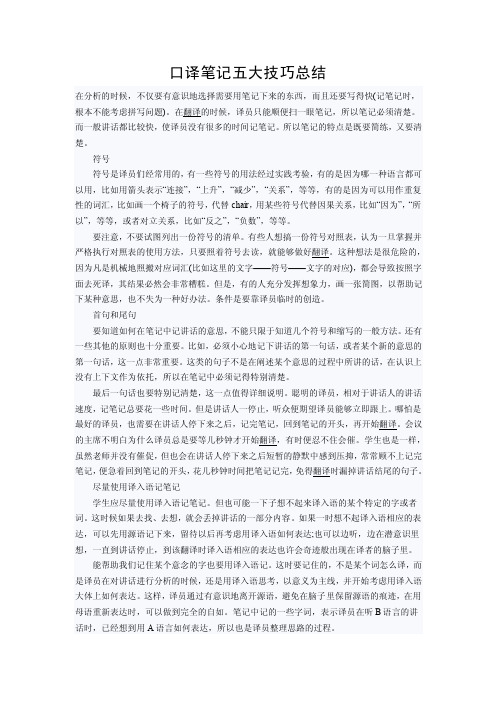
口译笔记五大技巧总结在分析的时候,不仅要有意识地选择需要用笔记下来的东西,而且还要写得快(记笔记时,根本不能考虑拼写问题)。
在翻译的时候,译员只能顺便扫一眼笔记,所以笔记必须清楚。
而一般讲话都比较快,使译员没有很多的时间记笔记。
所以笔记的特点是既要简练,又要清楚。
符号符号是译员们经常用的,有一些符号的用法经过实践考验,有的是因为哪一种语言都可以用,比如用箭头表示“连接”,“上升”,“减少”,“关系”,等等,有的是因为可以用作重复性的词汇,比如画一个椅子的符号,代替chair,用某些符号代替因果关系,比如“因为”,“所以”,等等,或者对立关系,比如“反之”,“负数”,等等。
要注意,不要试图列出一份符号的清单。
有些人想搞一份符号对照表,认为一旦掌握并严格执行对照表的使用方法,只要照着符号去读,就能够做好翻译。
这种想法是很危险的,因为凡是机械地照搬对应词汇(比如这里的文字——符号——文字的对应),都会导致按照字面去死译,其结果必然会非常糟糕。
但是,有的人充分发挥想象力,画一张简图,以帮助记下某种意思,也不失为一种好办法。
条件是要靠译员临时的创造。
首句和尾句要知道如何在笔记中记讲话的意思,不能只限于知道几个符号和缩写的一般方法。
还有一些其他的原则也十分重要。
比如,必须小心地记下讲话的第一句话,或者某个新的意思的第一句话,这一点非常重要。
这类的句子不是在阐述某个意思的过程中所讲的话,在认识上没有上下文作为依托,所以在笔记中必须记得特别清楚。
最后一句话也要特别记清楚,这一点值得详细说明。
聪明的译员,相对于讲话人的讲话速度,记笔记总要花一些时间。
但是讲话人一停止,听众便期望译员能够立即跟上。
哪怕是最好的译员,也需要在讲话人停下来之后,记完笔记,回到笔记的开头,再开始翻译。
会议的主席不明白为什么译员总是要等几秒钟才开始翻译,有时便忍不住会催。
学生也是一样,虽然老师并没有催促,但也会在讲话人停下来之后短暂的静默中感到压抑,常常顾不上记完笔记,便急着回到笔记的开头,花几秒钟时间把笔记记完,免得翻译时漏掉讲话结尾的句子。
- 1、下载文档前请自行甄别文档内容的完整性,平台不提供额外的编辑、内容补充、找答案等附加服务。
- 2、"仅部分预览"的文档,不可在线预览部分如存在完整性等问题,可反馈申请退款(可完整预览的文档不适用该条件!)。
- 3、如文档侵犯您的权益,请联系客服反馈,我们会尽快为您处理(人工客服工作时间:9:00-18:30)。
My Reflection of the Interpreting CourseIt’s really lucky for me to have taken the course of interpreting skills this term by Ms Yu, because this course really benefits me a lot.Above all, my listening skills have been improved to a much higher level than before through interpreting learning. We all know that, without a good listening to catch what the speakers say in source language, it would be impossible for us interpreters to transform it into the target language. Listening is the first and primary step for English learners to be a good interpreter. Keeping this realization in the mind, I pay my special attention to the study of listening. In the class, the routine of news listening always reminds me of the importance of listening towards this course.Nowadays, I have less difficulty in understanding what foreigners say in daily life. I can still follow speakers without referring to the Chinese translation when I watch movies. It is the Interpreting Course that pushes me to listen to English every day so as to avoid being rusty on the skills. I appreciate this class, not only because it helps to improve my listening ability, but also it makes me form a habit of listening to English every day. We are not English native speakers, so it is preeminently important for us learners to listen to it all the time so that we can immense ourselves in the atmosphere surrounded by English language. In the following days, the good habit will continue to accompany me. Keep listening, and I believe one day my listening skills will reach the level that a qualified interpreter should do.Another benefit I have got from the class is the improvement of my spoken English. Admittedly, an interpreter must be bilingually capable of not only listening but also speaking. Interpreting requires you to express in target language what you’ve got from the source language on the basis of understanding. In this sense, only being a good listener is not enough at all. When I knew the fact in the first class of this course, I really felt a big challenge in front of me. Spoken English was always my strongest weakness. Each time I tried to speak out English, the poor pronunciation and intonation can not be endured even by myself, still less by my listeners. So I chose to shut up my mouth. Avoid speaking it and then you would avoid discomfort and being frustrated by it, which was always the way I used to comfort myself before taking theclass. However, things change now. The Interpreting Course is different from the courses we have learned before. In the class of listening, reading, grammar and writing, most of the time is spent listening to the teachers’speech and no one will blame you if you choose to be silent. In this course, however, you have to speak out English, whether you like it or not.However, there still exist some problems after taking the class.Firstly, I find that different regional accents that English speakers have are the big obstacle for us English learners to overcome. We have indeed studied the foreign language for many years, but just focused on the standard English. So, when we listen to some non-standard English in our coursebook, we can hardly understand what the speakers are saying, not to mention interpret it. This gives us a reminder that you need to have a good mastery of different kinds of varieties of English, not just the Standard English if you as an interpreter want to perform well on different occasions.Secondly, the huge psychology stress is also a big problem we always meet when interpreting. When we learn the course, actually, we do the job in an ideal environment. We just listen to the sound recordings and interpret to ourselves. What only matters is our professional skill. However, interpreting in the real situation is not such a simple case at all. Psychology stress is a good example. The occasion, the persons you serve for, the atmosphere, all these things may cause your tension during your job and therefore bring a bad effect on your performance. Mistakes, embarrassment caused by stage fright occur very often. So, what we should do now to help us overcome ps ychology stress in the future’s interpreting job? Maybe, the best way is just to put yourself in the real situation. The more you have experienced, the more capable you would become of dealing with unexpected conditions. Therefore, if I’m asked whether I have some advice for our teaching, this is all I want to say—creating some chances for students to practice their interpreting theory and skills in the practical use. Possibly if will be a tough job, but it really can benefit us a lot!I always stick to this point and never doubt about it that we will get better and better in interpreting,with the help of Ms Yu.。
